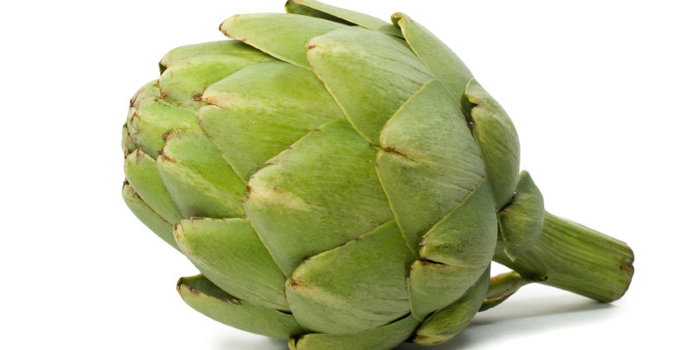Artichokes are one of the most attractive vegetables. The artichoke is a large thistle that belongs to the sunflower family. The green vegetable has several thick pointed leaves attached to a central heart. It resembles a large flower bud on top of a slender stalk. The soft petal bases and heart of the vegetable are the edible portions. It is one of the highly nutritious vegetables available during the winter. California leads in the cultivation of this vegetable where it is available throughout the year. This regally packaged vegetable has several nutrients.
Nutritional Content
The following is the nutritional breakdown for a medium-sized artichoke that weighs about 125 grams.
- Protein - 4 grams
- Carbohydrates - 13 grams
- Fat - 0.05 grams
- Cholesterol - 0
- Fiber - 6.5 grams
- Calcium - 50 mg
- Iron - 1 mg
- Potassium - 470 mg
- Phosphorous - 110 mg
- Magnesium - 75 mg
- Zinc - 0.5 mg
- Sodium - 115 mg
- Vitamins - A, B, E and K
The vegetable has a delicate flavor and numerous health benefits.
Health Benefits
Some of the health benefits that an artichoke delivers are:
- Cardiovascular health - the high quantities of potassium in the vegetable help to maintain normal heart rhythm. Research studies have shown a strong link between high potassium diets and reduced risk of stroke. Potassium also tones down the effect of sodium on blood pressure. This helps to maintain healthy blood pressure, which promotes good health of the heart. Certain phytonutrients in the vegetable help to lower bad cholesterol levels and reduce the risk of stroke and cardiovascular disease.
- Immunity - the artichoke is rich in phytonutrients and antioxidants. This helps to boost the body's immunity against diseases. It also promotes good health. These potent nutrients have been found helpful in the maintenance of healthy cells especially in cases of prostrate cancer. This is because they inhibit the proliferation of the cancerous cells. The vegetable has high contents of vitamin C which supports a healthy immune system. Color pigments in the vegetable reduce the risk of certain cancers.
- Digestion - the vegetable is rich in dietary fiber which supports a healthy digestive system. This helps to prevent constipation.
- Blood health - fiber helps to lower blood cholesterol, stabilizes blood sugar levels and lessens the risk of heart disease.
- Weight control - dietary fiber is regarded as a vital aid in weight control. This is because it helps one feel full, hence reduces food intake.
- Bone and muscle health - vitamin C assists in the formation of collagen. This protein supports the development of cartilage, bones, muscles and blood vessels. Magnesium helps to build healthy bones. It also supports muscle functions. Potassium supports the central nervous system and muscle functions.
Preparation
To cook the vegetable, you can steam, boil or microwave it. Baby artichokes cook faster than the older ones. They also yield more vegetable than the mature type. It can be used in soups and casseroles. You can also spread the leaves and pull out the center cone. Scrape the cavity with a spoon to clean then stuff with desired mixture. The heart of the vegetable is used to make a popular dip for chips or bread.



